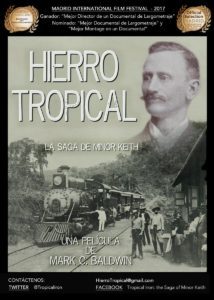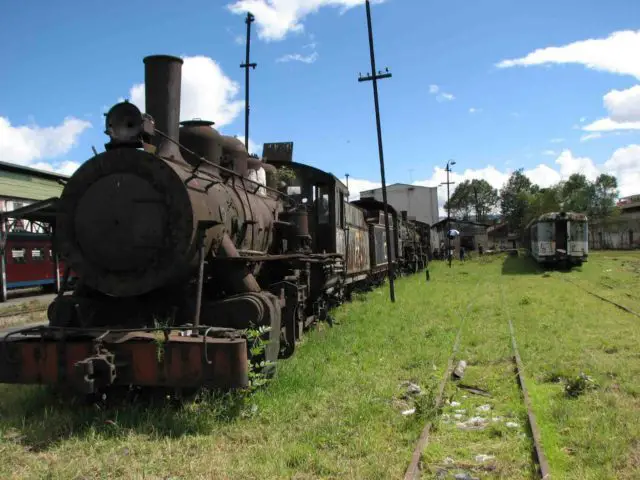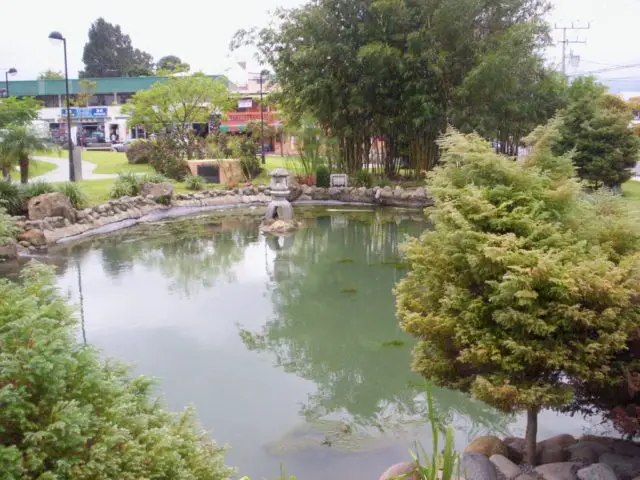A fascinating ride on railways, a professor of Spanish phonetics, and a typical Costa Rican family hooked forever American producer Mark Baldwin.
That relationship became stronger and took deep roots. Now Baldwin, editor of series such as “CSI: Miami”, “Ally McBeal”, and “Law and Order”, returned to the country not only to walk -as he has done so many times- but to present “Hierro Tropical”, the film that reviews Minor Keith’s life and the construction of the railway to the Atlantic Coast.

The film can be seen at the Magaly cinema and the producer told us about his life and the revealing documentary.
What motivated the filming of this documentary about the train to the Atlantic Coast?
I lived in the country in the 1970s and I had the good fortune to make the round trip to Limón by train. I was impressed. The landscape was extremely beautiful and interesting. The flora and fauna passed practically in one’s face. By walking a little slower and on rails, one had more opportunity to appreciate nature and feel in the middle of it. I remember very well all the passengers and street vendors who came to sell food. At each stop, one saw that they were railroad towns, where life was focused on the train.
“I heard stories of how difficult it was to build the railway line and the terrain I saw made you think, ‘how the hell did they make this railway?’.
How long ago began the development of the film and how was the research process?
About 7 years ago I made the first interview, but since I was a film student, I always thought that the construction of the railroad would be a good material to make a dramatic film, on the style of Fitzcarraldo or Warner Herzog. When I researched the story seriously, I found more than I expected.
“I read about the entire construction process and found the story of Minor Keith. Of course, Keith was a controversial figure as co-founder of the United Fruit Company (UFCO). I thought I had found the bad guy in the novel. Several people told me that Keith went to Costa Rica to build the railroad to take out the banana and it really was not the case. The railroad project was an ethical idea, headed by Tomás Guardia “.
In your own words, what is the movie about? Is it more about Keith or the train itself?
In the film, Keith’s life serves to frame the history of the railway and its results. For me, it is always better to focus on a human being to understand history. Keith was a very interesting character and his career helps to see many aspects of what was happening in Costa Rica at that time. It can be said that the film is about the railway and the UFCO, but seen in the context of Minor Keith’s life.

What was the most complicated thing about making this movie?
The most complicated thing about the movie was that I had to do it in my free time. I requested funds from several organizations but at last, I had to produce it alone, with my own resources. I spent 7 years doing it. I spent thousands of hours at home, nights and weekends, to do it.
In that same line, what has been the most satisfactory?
The most satisfying part of the film was meeting many people and corners of Costa Rica that I did not know before. I now have many friends that I would not have met without this movie. The premieres in Limón, Siquirres, Turrialba, and San José were great. Many people came very interested in the subject. I was very impressed with the interest that ticos have in history.
Has the film premiered in other countries, such as Spain? What has been your reception?
The world premiere of the film was at the Madrid International Film Festival. It was nominated in 3 categories and for that, I won an award as best director of a documentary feature film. The public loved it. No one knew anything about the subject and one of the directors who arrived told me that it was the best movie I had seen at the event.
As I said before, I lived in Costa Rica in the 1970s. I studied at the Spanish Language Institute in San Francisco de Dos Ríos. There I met my wife, which was my phonetics teacher. Then I studied at the School of Collective Communication of the University of Costa Rica. I have more than 40 years of visiting the country. I loved my in-laws very much when they were alive, and feel very close to my brothers-in-law, nephews, and cousins.

“My daughter Natalia is born in the United States but she also has a Costa Rican citizenship. Being a little girl, she also spent a lot of time in Costa Rica and knows the language and culture very well. She was the producer of the documentary “.
Why should Costa Ricans watch “Tropical Iron”?
I hope the tico audience watches “Tropical Iron” because of the national history that counts. A country like Costa Rica, which places so much emphasis on education, will always look for works like this one to examine its past. Only the almost 700 old photographs that the film contains will be enough to attract a large number of Costa Ricans.
“In addition, the construction of the railway to the Atlantic Coast greatly influenced the formation of the modern Costa Rican state and, in this film, I made a lot of effort to portray it faithfully”, Baldwin concluded.
